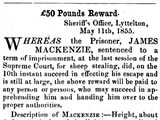What happened that day?
See historic events for any day of the year by entering the date below. Why not try your birthday?
Kiwi of the Week
Today in History

1855 Legendary sheep rustler James Mackenzie caught
In 1855 James Mackenzie became one of New Zealand’s most enduring folk heroes. On 4 March he was caught in a pass in the upper Waitaki River basin with 1000 sheep that had gone missing from the Levels station, north of Timaru.
While Mackenzie was in possession of the sheep, there were tracks belonging to several other men. He denied the theft, claiming that he had been hired by John Mossman to drive the sheep to Otago. Mackenzie escaped and walked 160 km to Lyttelton, where he was recaptured on 15 March. In April he was found guilty by a Supreme Court jury and sentenced to five years’ hard labour.
Mackenzie escaped from his road gang in May and again in June 1855, for only a few days each time. He was placed in irons and carefully watched. In September a new resident magistrate at Christchurch investigated Mackenzie’s case and found flaws in both the police inquiry and the trial. As a result Mackenzie was pardoned in January 1856. He probably returned to Australia, but nothing certain is known of his later life. He left his mark on the South Island high country, though. The significance of the pass where he was discovered with the sheep, and of the pastoral country it led to, were quickly appreciated by pastoralists. The region was subsequently dubbed the Mackenzie Country.
A later biographer, Cathy Marr, says that ‘Mackenzie’s exploits won him the admiration of those on the margins of society’. He was a hero to many would-be farmers of small means. Those who resented the power of wealthy landowners also identified with him, and his rebellious spirit inspired many who did not fit easily into genteel Canterbury society. His pardon won popular sympathy in a frontier society still engaged in establishing its social and political norms. His life took on legendary proportions. His almost superhuman strength and a ‘fabulous’ dog saw him held up as shepherd, drover and thief extraordinaire.
Image: notice of reward for capture of James McKenzie in the Lyttelton Times (See more detail at the DNZB)




















